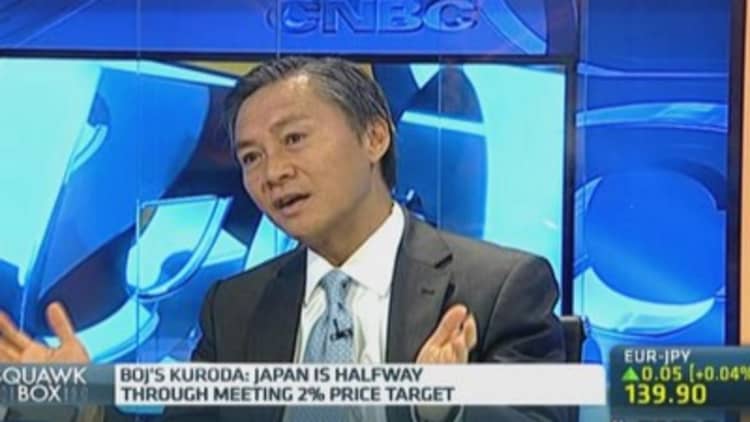Asian markets started the data-light week on the back foot, with major indices posting steep losses. However, a post-election boost helped New Zealand shares outperform their Asian peers, rallying over 1 percent.
Over the weekend, finance ministers and central bank chiefs from the Group of 20 met in the Australian city of Cairns. They said they were close to adding an extra $2 trillion to the global economy and creating millions of new jobs, but noted Europe's extended slowdown remains a major stumbling block.
Wall Street finished mixed last Friday, as investors welcomed Alibaba's market debut and Scotland's vote to remain in the U.K. The Dow ended up 0.1 percent, leaving it 1.7 percent higher on the week. The was little changed while the tech-heavy Nasdaq shed 0.3 percent.
China markets down
Shanghai shares widened losses to close down 1.7 percent amid fears that Tuesday's preliminary reading on the Chinese manufacturing sector could provide more evidence of a slowdown. "The macro event of the week may be tomorrow's release of HSBC flash manufacturing PMI for September. The consensus forecast is 50.0, down two ticks from the final August print," Tim Condon, head of Research-Asia at ING Financial Markets, wrote in a note.
Bank of Communications skidded over 3 percent while Bank of China and Agricultural Bank of China lost nearly 2 percent, respectively.
Hong Kong's benchmark Hang Seng Index fell 1.3 percent to its lowest levels since 23 July. Among top losers, luxury brand Prada hit a 26-month low on Monday after it announced that it had been hurt by China's slowdown.
Read MoreAsia looks at China PMI in quiet week
Tokyo loses 0.7%
A slightly stronger yen, trading below 109 against the greenback, dampened trading sentiment for Japanese shares which touched a seven-year closing high last Friday.
Profit-taking on index heavyweight Softbank also weighed on the benchmark Nikkei index. Shares of the telecommunications and internet firm widened losses to close down 6 percent, after having surged 30 percent over the past 6 weeks in anticipation of Alibaba's listing in the U.S..
Mitsubishi Motors finished 4 percent higher on news that the automaker will produce a new pickup for Fiat in 2016 and will team up with the Italian carmaker to raise output at the latter's plant in Thailand.

Sydney falls 1.3%
Hefty losses in mining and banking majors dragged Australia's benchmark S&P ASX 200 lower on the first day of the trading week.
In the mining space, Fortescue Metals and Rio Tinto lead declines with losses of 4.8 and 2.5 percent each as iron ore prices slumped. "Iron ore collapsed once more and is now back at 2008 lows of US$81.70 a tonne. Very cyclical material plays will feel further pain," IG's market strategist Evan Lucas wrote in a note. "The trend in the ASX is certainly on the downside until commodities find a floor."
Banking shares also suffered; Westpac, National Australia Bank and Australia and New Zealand Bank skidded over 2 percent, respectively.
Read MoreIMF's Lagarde: Confident G-20 will reach growth target
Seoul declines 0.7%
South Korean equities tracked Asia-wide losses on Monday as declines in blue-chips weighed on the Kospi index. Samsung Electronics and LG Electronics plunged 2 percent each.
South Korea shipbuilders were in the limelight after a local agency downgraded the credit ratings for major shipbuilders. Samsung Heavy and Hyundai Heavy reversed early gains to close down more than 1 percent, respectively.
Read MoreKiwi stocks cheer election result, but headwinds loom
Wellington soars 1%
New Zealand's NZX-50 index outperformed the region on the back of power companies which raked in hefty gains following a re-election of the National government over the weekend.


